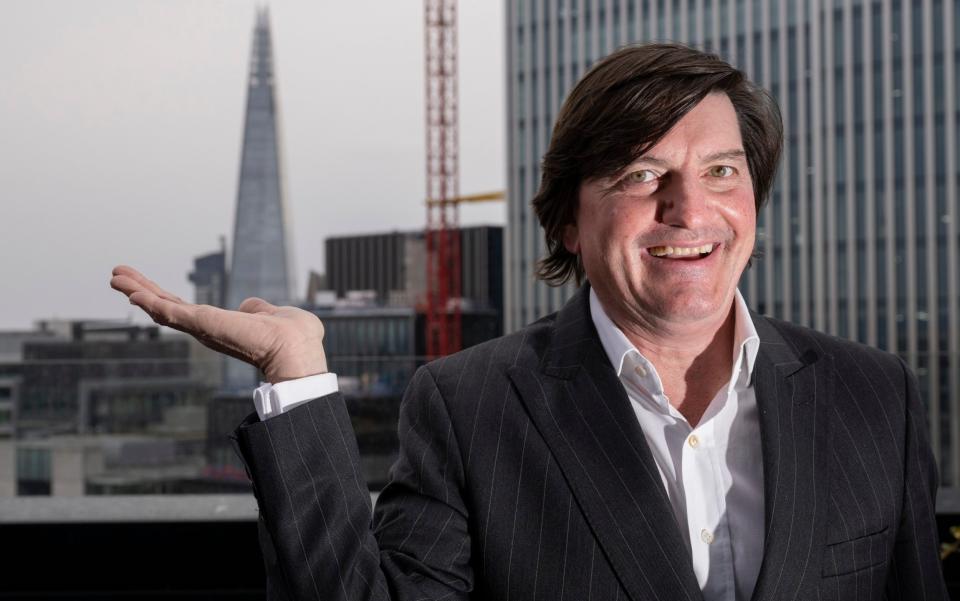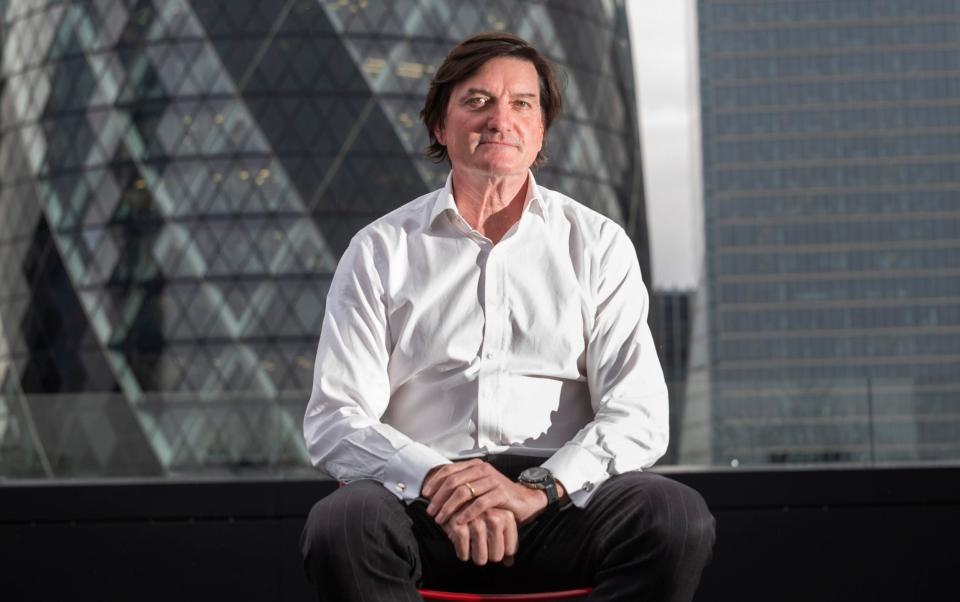[ad_1]

Insurers will go bust if they are forced to cover the cost of Vladimir Putin’s war in Ukraine, the founder of one of the world’s biggest brokers has warned.
David Howden, who has built an £11bn eponymous insurance empire, said his industry cannot be expected to cover the cost of war, amid a row over Mr Putin’s seizure of hundreds of commercial aircraft.
Mr Howden said: “The insurance market cannot be a systemic backstop for a war between the UK and Russia. And it’s not designed to be. No policies cover it.
“Otherwise, if we covered it all, it would actually end up with the Government anyway – we’d all go bankrupt.”
Russian authorities seized 500 commercial aircraft owned by overseas leasing companies shortly after the outbreak of war against Ukraine.
The owners, mostly domiciled in Ireland, have tried to claim on insurance but have been rebuffed. They are now suing Lloyd’s of London insurers for their refusal to pay out up to $10bn (£8bn) in claims. A legal showdown in the High Court is scheduled for next year.
Mr Howden said insurers are legitimately refusing to pay under the terms of certain types of cover.
He said: “Ultimately, war has never been something that insurance has been there to cover.”
If insurance policies were broad enough to cover the impact of war, it would force the Government to bail out companies “because there is not enough capital in the insurance market to pay for it,” he said.
“The insurance industry – no-one quite knows – [but it’s] four or five trillion dollars of capital. It’s small. It’s a tenth of the derivative market, for example.”

Howden Group has not underwritten policies itself but has deep connections within the industry as Europe’s largest broker.
The row over the “stolen” planes in Russia comes with the UK insurance sector still reeling from a public backlash to its refusal to pay claims under business interruption policies during the Covid pandemic.
Small businesses and the UK’s financial regulator challenged the industry in court, with the Supreme Court ultimately ordering insurers to pay out.
Mr Howden admitted that insurers had handled the crisis poorly.
He said: “Did we cover ourselves in glory over business interruption during the Covid pandemic? No, we didn’t. Should we respond differently? Yes, we should have.”
He said insurers were too focused on the technical detail of policies despite the extraordinary circumstances.
“When the claims come, the insurance company, rightly from a technical point of view but maybe wrongly from a PR point of view, say: ‘I’m very sorry, that’s not covered by our policy.’”
The insurance industry is currently facing a new headache over how to handle cyber insurance.
Members of Lloyd’s of London, the 335-year-old insurance market, have been angered by the institution’s insistence that all cyber policies exclude “state-backed” attacks.
Many hackers are based in countries such as Russia and North Korea. Clarifying which ones are and aren’t backed by the state can be more of an art than a science.
Lloyd’s members complain that the blanket policy is too broad and prevents them from offering coverage they would be happy to sell.
Mr Howden called the row over cyber insurance “ridiculous”. The straight-talking 59-year-old said: “The excitement over cyber is ridiculous.”
“We’re trying to be clear and we try to tell people it’s not covered, [but] suddenly – because we are bad at PR – people go: ‘Oh, my God, they are excluding war.’ It’s never been covered.”
Mr Howden suggested Lloyd’s should settle the argument by drawing up official guidance as to what constitutes a state-backed attack, which the marketplace worries would leave members open to “systematic risk.”
He said: “Most wars are easy to define. Cyber wars are more difficult to define.
“What we should have on cyber is one of the very smart GCHQ people define what is a war, and what is systemic attack. And then you could go out and separately buy from the insurance market your war coverage.”
Mr Howden started his eponymous empire in 1994 with three employees, a dog and £25,000 of funding from an angel investor. These days the company is headquartered in One Creechurch Place, a 156 metre skyscraper in the heart of the City that looks directly over onto the second floor office where it all began.

Employing 14,500 people – 6,500 of them in the UK – across 50 countries, Howden Group is a towering presence within the insurance sector.
Mr Howden has created the largest insurance broker in the UK – and the biggest operator outside of the US – through a series of shrewd acquisitions, turbo-charged by private equity investment from General Atlantic and Hg Capital alongside funding from Canadian pension fund CDPQ.
Yet Howden Group is the UK’s fifth-largest employee-owned business, with 4,500 employees owning 35pc of the company.
“Employee ownership is amazing,” Mr Howden said. “We’ve built a business around people.”
The buy-in from staff has helped foster a positive culture without too much effort, he said.
“People care about people and people seem to be having fun. That’s culture. It’s like within your family or friends, it’s how you behave, how you act.”
“Anywhere where I go where they have got their culture on the wall, you know that’s not their culture. You know they are lying.”
Howden Group’s combination of employee-ownership and private investment is precisely the model now being considered by John Lewis, Britain’s biggest employee-owned business.
Mr Howden said: “We don’t have any dividends at all. All the money we make, we reinvest back in, unlike a public company that would use a lot of its capital to pay dividends.”
The long-standing executive is a refreshing counterpoint to the majority of Britain’s carefully manicured executives. Running a privately-owned business means he does not have to mince his words.
“We don’t make f****** kitchens!” he exclaims when asked about Howden Joinery, the kitchen supplier that shares the business’ name and is better known to the general public.
“They’re worth half what we’re worth. They are worth £3.6bn, we are worth £7.2bn.” (Add in Howden’s roughly £4bn in debt and the group boasts an enterprise value in excess of £11bn.)
Mr Howden laments that his business is not as well known as publicly traded peers such as L&G or Aviva.
“We’re opening more offices on the high street than anyone else. We’ve got a market cap that is more than Sainsbury’s – but no-one has heard of us!”
Howden Group’s head offices are an extension of its co-founder’s personal tastes. Life-size figures of dogs, oodles of artwork and clocks of all shapes and sizes are littered across the 14th floor of the company headquarters.
“These clocks are all Howden clocks, because we were clockmakers as well,” he explained, referencing the Victorian clockmakers who bore his family’s name.
For the insurance sector to flourish, it must shake off its stuffy past, he said. Above his office is a cafe and neon-signed bar stocked with beer and wine aplenty – more Shoreditch than Square Mile.
“We want to attract people who aren’t in insurance. We want to get really bright young kids who think they’re going to work with Google,” he said. “Don’t work for Google, come to Howden.”
Mr Howden was arguably destined for a career in insurance. After dropping out of Radley College following his O Levels, he started working at City broker Alexander Howden in 1981. The company had originally been founded by his great-great-great grandfather, though the family connection had been lost by the time he joined.
Today, he lives in Oxfordshire’s Cornbury Park estate, best known among younger generations as the venue that hosts the Wilderness music festival.
“I love life,” Mr Howden said. “I think to be good at a job, you’ve got to be good at life. I don’t think you can really just be a workaholic.”
[ad_2]
Source link
(This article is generated through the syndicated feed sources, Financetin doesn’t own any part of this article)
